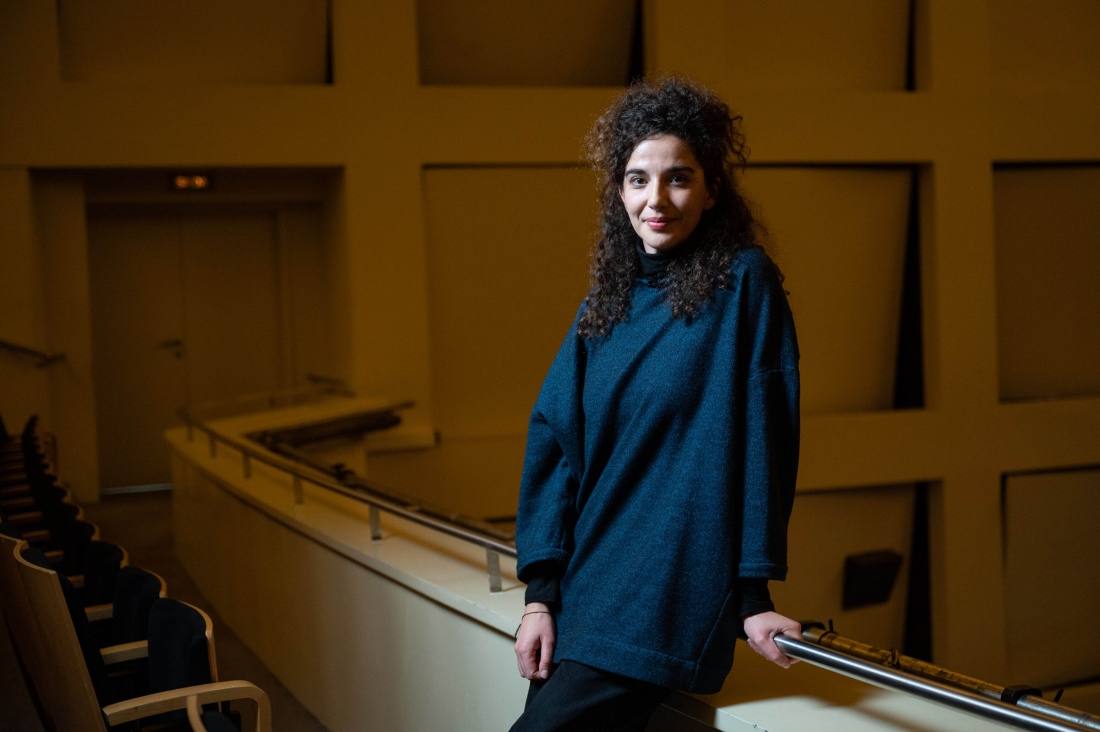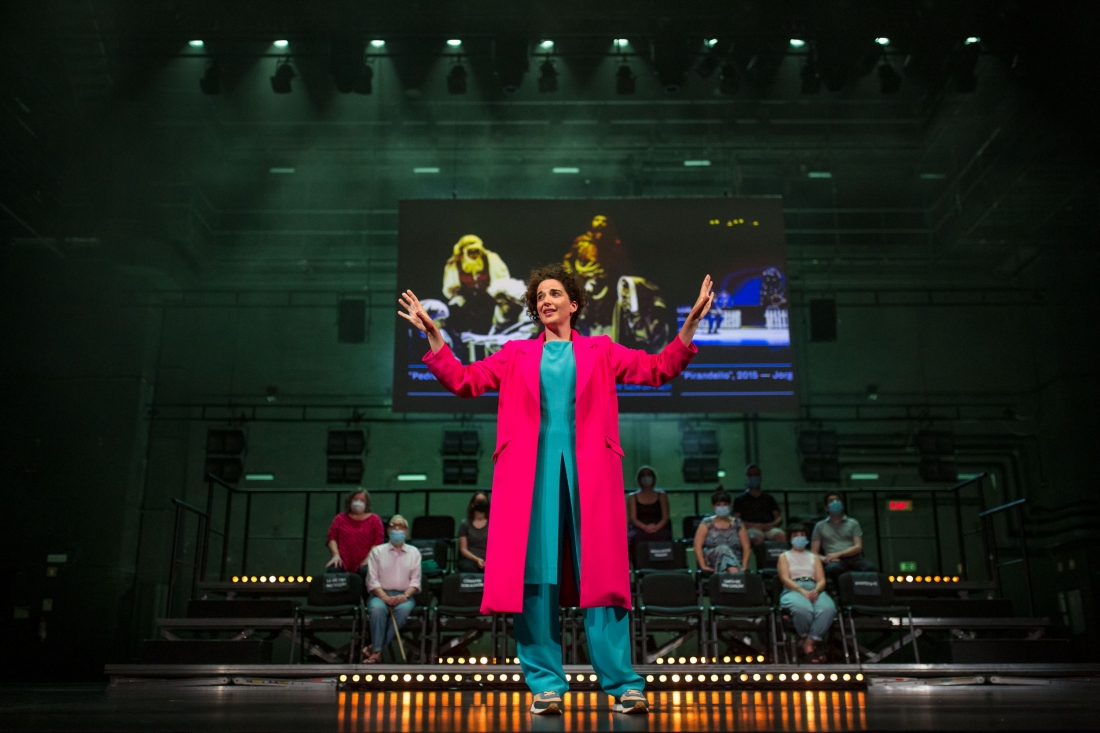Interview
Raquel André
December
2022
Thu
15
In Collection of Spectators, the stage belongs to the audience. Raquel André presents a show that is a museum, this Thursday and Friday, December 15th and 16th, in the Grand Auditorium of Teatro Rivoli. A large archive of testimonies, as the project's creator explained to us.
How do you collect spectators? How do you get someone who collects to talk and choose/from your collection?
For this work, Coleção de Espectador_s [Collection of Spectators], I hold a workshop for six days with Cláudia Gaiolas. We work with a group of 10 spectators and we have several exercises prepared. The dramaturgy is already assembled and, then, based on the exercises that we carry out with these people, we introduce the stories of each one of them. Before the creation of the show, I created a website (collectionofspectators.com) that has a group of instructions that I launched over several months, where spectators from different parts of the world could participate. It is a digital archive with the spectators' memories. For the show I used this methodology, this idea of instruction. During the workshop, we have some instructions for the spectators to be able to organize their memories. In fact, stories that they carry with them, and this instruction allows them to organize their memory. For example, making a chronological map of life as a spectator. Identify some artistic events such as shows, books, concerts, architecture, statues, visual arts. Everything we consider artistic events. And thus, tell their life story from these artistic events that somehow transformed their life.
How would you characterize the group of people selected for the presentations at Rivoli?
My desire is to always have a group as diverse as possible, whether in age, generation, social, economic or cultural background. I try to work with people who have very different life stories and experiences. And that's what happened here, in Porto. It's great that we managed to have this completely different group... An 18-year-old spectator, a 67-year-old spectator – it's a very big age difference... There are people who live in Porto, but were born in Brazil or in other places in Portugal. There is, in this sense, some diversity in the group.
In this work, you invite a group of spectators to leave the audience and go up to the stage, with their stories. What possibilities and places become possible to access with this transposition, this transgression?
That is, for me, the most important movement and the one that made me want to put on this show: returning the artistic work that normally has the voice of the artists who are creating it (and who has their technical and artistic teams) to the spectators. To give back, in a way, what remains in these people's memory. In fact, this gesture is very fast... It is much bigger than what artists produce, it plays in very different places from person to person. It tells their story... Sometimes, such particular stories – of transformation or funny or tragic memories – or personal narratives. This gesture is very fast because we all have, for example, a playlist of songs that would be the soundtrack of our lives, many of us have books that tell our story. It's a very fast move. And, here, the priority is to give space, to give a place – in this case, a stage – for these stories to be told. Returning these memories to spectators, but also to artists and professionals who make a show possible.
As a spectator, do you have any remarkable memories here at TMP that you would like to share with us?
The truth is that since I'm not from Porto, I've never seen many shows here. I saw one at DDD – Festival Dias da Dança, in 2018, by a Norwegian company (Carte Blanche), from Bergen, where the dancers spent two hours spinning around on themselves. It was something cathartic for me because I was feeling my body spinning too. It was for a long time, the auditorium was completely full. And I was wondering how we spectators, sitting and passive, can experience something so cathartic. Despite the body being still, we were also spinning with the dancers.
How do you collect spectators? How do you get someone who collects to talk and choose/from your collection?
For this work, Coleção de Espectador_s [Collection of Spectators], I hold a workshop for six days with Cláudia Gaiolas. We work with a group of 10 spectators and we have several exercises prepared. The dramaturgy is already assembled and, then, based on the exercises that we carry out with these people, we introduce the stories of each one of them. Before the creation of the show, I created a website (collectionofspectators.com) that has a group of instructions that I launched over several months, where spectators from different parts of the world could participate. It is a digital archive with the spectators' memories. For the show I used this methodology, this idea of instruction. During the workshop, we have some instructions for the spectators to be able to organize their memories. In fact, stories that they carry with them, and this instruction allows them to organize their memory. For example, making a chronological map of life as a spectator. Identify some artistic events such as shows, books, concerts, architecture, statues, visual arts. Everything we consider artistic events. And thus, tell their life story from these artistic events that somehow transformed their life.
How would you characterize the group of people selected for the presentations at Rivoli?
My desire is to always have a group as diverse as possible, whether in age, generation, social, economic or cultural background. I try to work with people who have very different life stories and experiences. And that's what happened here, in Porto. It's great that we managed to have this completely different group... An 18-year-old spectator, a 67-year-old spectator – it's a very big age difference... There are people who live in Porto, but were born in Brazil or in other places in Portugal. There is, in this sense, some diversity in the group.
In this work, you invite a group of spectators to leave the audience and go up to the stage, with their stories. What possibilities and places become possible to access with this transposition, this transgression?
That is, for me, the most important movement and the one that made me want to put on this show: returning the artistic work that normally has the voice of the artists who are creating it (and who has their technical and artistic teams) to the spectators. To give back, in a way, what remains in these people's memory. In fact, this gesture is very fast... It is much bigger than what artists produce, it plays in very different places from person to person. It tells their story... Sometimes, such particular stories – of transformation or funny or tragic memories – or personal narratives. This gesture is very fast because we all have, for example, a playlist of songs that would be the soundtrack of our lives, many of us have books that tell our story. It's a very fast move. And, here, the priority is to give space, to give a place – in this case, a stage – for these stories to be told. Returning these memories to spectators, but also to artists and professionals who make a show possible.
As a spectator, do you have any remarkable memories here at TMP that you would like to share with us?
The truth is that since I'm not from Porto, I've never seen many shows here. I saw one at DDD – Festival Dias da Dança, in 2018, by a Norwegian company (Carte Blanche), from Bergen, where the dancers spent two hours spinning around on themselves. It was something cathartic for me because I was feeling my body spinning too. It was for a long time, the auditorium was completely full. And I was wondering how we spectators, sitting and passive, can experience something so cathartic. Despite the body being still, we were also spinning with the dancers.




